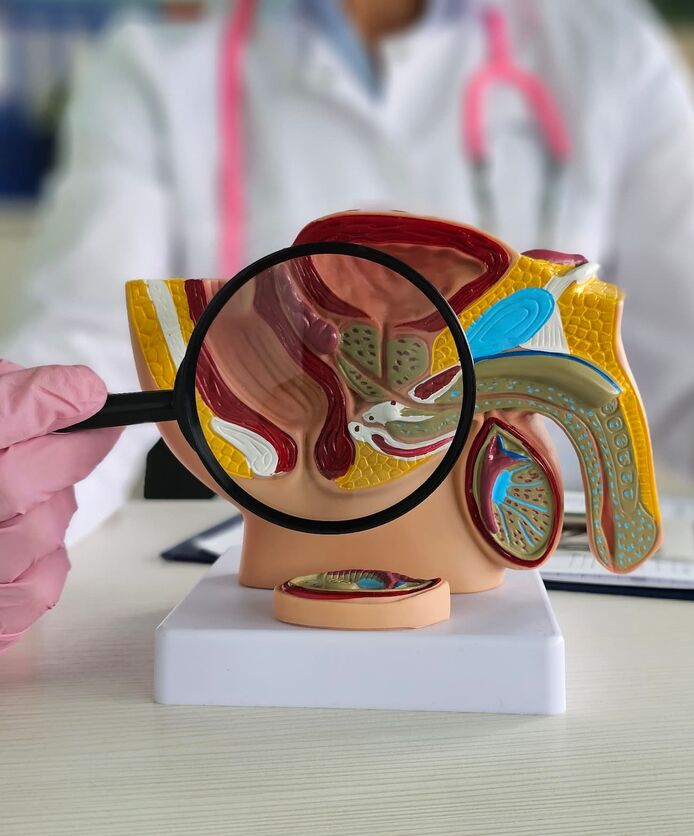What is erectile dysfunction?

Also known as impotence, erectile dysfunction is a very common condition affecting lots of men in the UK. Learning more about this condition is key to understanding how it affects those who experience it, knowing when to seek medical advice about it and exploring different treatment options if needed.
What’s erectile dysfunction?
Although the name might seem clinical and hard-to-understand, erectile dysfunction is just the medical term for when you can’t get an erection, or can’t maintain one long enough to have sex. Technically, it’s not a disease or illness but rather a symptom. There are a number of potential causes behind erectile dysfunction, and although treatment isn’t always necessary, there are a range of options available.
It’s important not to underestimate just how common erectile dysfunction is. A 2022 study estimates that as many as 41.5% of UK men have experienced erectile dysfunction at one time or another. That’s more than 1 in 3 UK men, so if you haven’t experienced it yourself, it’s likely that someone you know has.
Despite this, erectile dysfunction isn’t often discussed. Men might feel ashamed or embarrassed to mention it, which can lead to the problem going undiagnosed and untreated. In part, this could be to do with the statistic that erectile dysfunction is more common in older men. While it’s true that the condition seems to be increasingly more common and more severe in older age groups, that doesn’t mean that younger men can’t experience it. In most cases, erectile dysfunction is nothing to worry about and, as a medical condition like any other, there’s no need to be ashamed.
This is especially true if you’re considering seeking medical advice about erectile dysfunction. Medical consultations are completely confidential, so you can rest assured that anything you say will go no further than the consultation discussion. And the best part is that, where treatment is necessary, there are a number of medications available, such as Viagra or tadalafil, to help take care of the problem.
If you’re on the fence about whether or not to seek advice about erectile dysfunction, it’s worth knowing that it can be a risk factor for cardiovascular disease and may indicate an underlying condition. Although the majority of cases are nothing to worry about, it’s better to be safe than sorry and be screened for heart problems so that your doctor can advise you on the best course of action if they find anything.
How to know if you have erectile dysfunction
One of the most important things to remember about erectile dysfunction is that it affects most men at some point. For some men, erectile dysfunction is something they experience occasionally, but which resolves itself and doesn’t have a big impact in the long term. In many cases, it’s nothing to worry about - potentially just a symptom of being overly stressed or perhaps over-indulging on alcohol the night before.
Sometimes, the way you experience erectile dysfunction can give you clues as to its cause. Although the condition is described as an inability to get or keep an erection, that doesn’t mean that’s the case 100% of the time. Some people with erectile dysfunction find that they still get erections in the mornings or through masturbation, for example, but have difficulty when it comes to sex. If this is the case, it’s likely that the problem may have a psychological cause, as you are still physically able to develop an erection.
Some people, on the other hand, find that they can’t get an erection at all when living with erectile dysfunction. This could indicate that the underlying issue is physical - although there may still be a psychological factor. Whatever the case, if you’re concerned about erectile dysfunction, the best thing to do is to speak with a medical professional.
Another symptom you might experience as a result of erectile dysfunction is a loss of libido or sex drive. This can be distressing and may put an increased strain on your relationships. As well as this, erectile dysfunction can lead to feelings of depression, shame or low self esteem, each of which can be very impactful.
The more prolonged your erectile dysfunction symptoms are, the more likely it is that there is an underlying condition affecting your ability to get an erection. It’s recommended that you should seek medical advice if you have erectile dysfunction for longer than three weeks or if it keeps recurring. However, that doesn’t mean you should avoid a consultation until this happens. Whatever the specifics, if you think you might have erectile dysfunction and that treatment to reduce your symptoms would improve your day-to-day life, it’s worth speaking to a pharmacist about your options.

Which contraceptive pill is best?

How to get rid of flu

What causes erectile dysfunction?

What are the symptoms of flu?

How to delay your period

